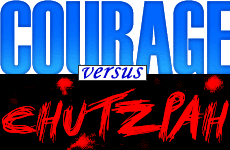 Iran’s Attack on Israel
Iran’s Attack on Israel


5 min read
Boldness and brazenness are two sides of the same coin. What leads to great acts of courage, the other can render great harm. But both can be turned to do good.
Chutzpah and courage have certain elements in common. But they are on the opposite ends of the scale. Courage is a great virtue, while chutzpah is generally a negative trait.
An extreme form of chutzpah is exemplified by someone who murders his parents and then claims that the court should be lenient with him because he is an orphan.
A more common form is exemplified by a child who speaks rudely to a parent, or by a student speaks to a teacher without respect. Chutzpah usually denotes that someone is doing or saying something that is not appropriate.
The sage Yehudah ben Teima made two statements which are cited in the "Ethics of the Fathers."
Be as bold as a leopard, light as an eagle, swift as a deer, and strong as a lion, to do the will of our Heavenly Father. (5:23)
The brazen goes to Gehinnom, but the bashful one goes to the Garden of Eden. (5:24)
In the first statement, we see that being bold -- in Hebrew az -- is a virtue. In the second statement, the sage uses the strongest language to condemn someone who is brazen -- in Hebrew az ponim.
What makes the difference between the quality that is very positive and the one that is very negative?
TWO DISTINCTIONS
The praiseworthy quality is when someone is bold in order to fulfill the will of the Creator.
This was the boldness of the courageous souls who withstood the Inquisition and adhered to the Torah even though they were risking their lives. This was the boldness of those who did what they could in the ghettos and concentration camps during the Holocaust to observe any possible mitzvah.
This was the boldness of the courageous souls who kept Torah even though they risked their lives.
This was the boldness of those who studied Torah when it was banned in the former Soviet Union. This was the boldness of those who observed Shabbat in the United States during the Great Depression the years that followed, when the pressure was great to take any available job that required work on Saturday. This was the boldness that many people express in less dramatic situations when they observe Torah even though they are met with opposition.
Another distinction is that which is described by Rabbi Chaim of Volozhin. True courage is that which is inside your heart. You speak and act with courage, but you do not make an issue of it to anyone else.
The Hebrew words for the negative form of brazenness -- az ponim -- can be translated more literally as "insolence on one's face." The chutzpah is recognizable on one's face. That is not the positive attribute of having inner courage.
If a person does have the negative trait of chutzpah, instead of trying to become meek and quiet, he or she should find positive ways to speak and act with courage.
As the Vilna Gaon (Commentary to Proverbs 22:6) points out, we might not be able to change our temperament, but we can channel it in the proper direction. The more chutzpah we previously had, the more good we can now do. We will be able to do things that others would be afraid to do.
SPEAKING OUT
When I was a young child, I was fearless around other people. I had the ability to say whatever came to my mind. At first I was too young to understand that I needed to be more diplomatic about what I said and how I said it. My parents kept telling me to refrain from saying things that they told me were chutzpadik to say. But I would argue, "Why is this chutzpah? This is the truth."
As a child, I didn't realize that even when speaking the truth, there are unacceptable ways to express one's self.
I didn't realize that even when speaking the truth, there are acceptable ways to express one’s self and there are unacceptable ways. Teachers kept telling me that I have chutzpah and I would disagree with them. I didn't understand why they didn't understand that I was speaking the truth.
Finally I had a teacher who understood me. This teacher realized that I didn't mean to do anything wrong. "You have a tremendous talent," my teacher told me. "You have a responsibility to use it for the good. You need to be more aware how the way you say things affects people. You will be able to do many acts of kindness with your ability to say whatever you feel is right. You will be able to ask people to donate money to charity and worthwhile organizations. You will be able to suggest to people that they need to correct their actions and their traits. But what you have is like dynamite. It can be used for building and it can be used for destroying. The more powerful the explosive, the more careful one needs to be with it."
This teacher gave me a number of private lessons to help me differentiate between positive and negative ways to say things. This was the most important lesson in the world for me. I am very grateful that this teacher didn't just tell me that I had chutzpah. Rather this teacher showed me how to utilize it properly.
Excerpted with permission from "COURAGE" by Rabbi Zelig Pliskin, a personal development coach in Jerusalem. Published by ArtScroll/Mesorah Publications Ltd., Brooklyn, NY. Web: http://www.artscroll.com
